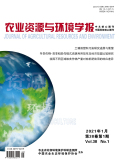农业资源与环境学报2024,Vol.41Issue(5):997-1003,7.DOI:10.13254/j.jare.2024.0224
基于农田生境管理的农作物害虫生态防控研究进展
Research advances on ecological pest control of agricultural crops based on farmland habitat management
摘要
Abstract
The intensification of agriculture has led to the loss of non-crop habitats,resulting in a sharp decline in farmland biodiversity and weakening the control of agricultural pests by their natural enemies.The resurgence of pests and the serious threat of pesticide residue contamination pose significant risks to food security.Conservation of farmland biodiversity through farmland habitat management and the utilization of ecological control of crop pests based on the balance among organisms are crucial for addressing the ecological and environmental issues in intensified farmland.It represents the fundamental approach to promoting green and sustainable agricultural development.This paper briefly outlines the development of ecological pest control in agriculture,systematically summarizes the concepts,principles,techniques,and advancements in farmland habitat management.It focuses on prospects for theoretical research,methodological advancements,and organizational practices in non-crop habitat management,aiming to provide insights for theoretical research and practical applications in ecological pest control of agricultural crops.关键词
农田生境管理/非作物生境/生物多样性/自然天敌/农作物害虫/生态防控Key words
farmland habitat management/non-crop habitats/biodiversity/natural enemies/agricultural pest/ecological control分类
农业科技引用本文复制引用
张艳军,杨殿林,王慧,赵建宁,张海芳,何北辰,刘雨欣,向子仪,王杰..基于农田生境管理的农作物害虫生态防控研究进展[J].农业资源与环境学报,2024,41(5):997-1003,7.基金项目
国家自然科学基金项目(32271651) (32271651)
中国农业科学院科技创新工程(农业农村部环境保护科研监测所)National Natural Science Foundation of China(32271651) (农业农村部环境保护科研监测所)
Chinese Academy of Agricultural Sciences Innovation Program(Agro-Environmental Protection Institute) (Agro-Environmental Protection Institute)

